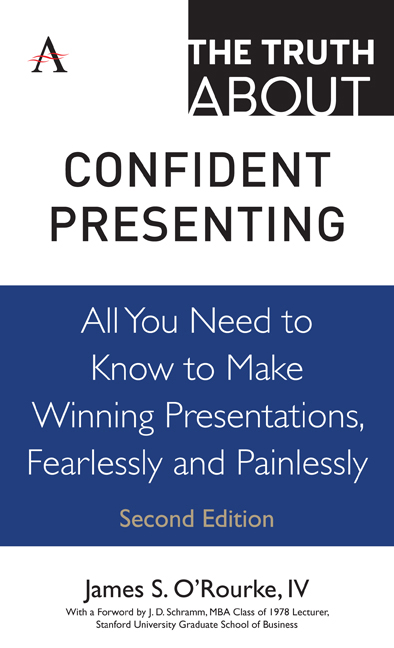 The Truth about Confident Presenting
The Truth about Confident Presenting Book contents
- Frontmatter
- Contents
- Foreword
- Introduction
- Part I Some Initial Truths
- Part II The Truth About Getting Ready to Speak
- Part III The Truth About What Makes People Listen
- Truth 13 Understand what makes people listen
- Truth 14 Your speaking style makes a difference
- Truth 15 Anticipate the questions your audience brings to your presentation
- Truth 16 Listening matters
- Truth 17 Being an active listener brings real benefits
- Truth 18 You can overcome the barriers to successful communication
- Part IV The Truth About Developing Support for Your Presentation
- Part V The Truth About Getting Up to Speak
- Part VI The Truth About Managing Anxiety
- Part VII The Truth About Nonverbal Communication
- Part VIII The Truth About Visual Aids
- Part IX The Truth About Handling an Audience
- Part X The Truth About What Makes a Presentation Work
- References
- Acknowledgments
- About the Author
Truth 15 - Anticipate the questions your audience brings to your presentation
from Part III - The Truth About What Makes People Listen
- Frontmatter
- Contents
- Foreword
- Introduction
- Part I Some Initial Truths
- Part II The Truth About Getting Ready to Speak
- Part III The Truth About What Makes People Listen
- Truth 13 Understand what makes people listen
- Truth 14 Your speaking style makes a difference
- Truth 15 Anticipate the questions your audience brings to your presentation
- Truth 16 Listening matters
- Truth 17 Being an active listener brings real benefits
- Truth 18 You can overcome the barriers to successful communication
- Part IV The Truth About Developing Support for Your Presentation
- Part V The Truth About Getting Up to Speak
- Part VI The Truth About Managing Anxiety
- Part VII The Truth About Nonverbal Communication
- Part VIII The Truth About Visual Aids
- Part IX The Truth About Handling an Audience
- Part X The Truth About What Makes a Presentation Work
- References
- Acknowledgments
- About the Author
Summary
As listeners arrive in a conference room, lecture hall or auditorium, they already have questions in mind about the topic. They have other concerns, as well: will this be painful or pleasant? Will I learn anything today? Is any of this going to be useful or will it simply be a waste of time? In addition to the usual anxieties people have about attending a presentation, most audiences will have the following kinds of questions about the speaker, as well.
Do you know what I need to know? As the audience sizes you up, your task is to convince them that you know something they either want or need to know. You should state your credentials or experience in the introduction and give a brief overview of your talk. If you can show them what you know, up front, they may pay attention long enough to learn something.
Can I trust you? People will trust someone they believe, as well as someone they respect and think is fair. Borrowing credibility from others as you begin is often a good way to establish your trustworthiness. This is most easily done by arranging for someone the audience trusts to introduce you.
Am I comfortable with you? If you make the audience nervous or uncomfortable during your speech, they aren't going to learn much. If they aren't having fun or don't want to be in the room with you, you'll have little chance of influencing them in a meaningful way. Demonstrating that you're at ease and comfortable with the audience, topic and occasion are ways to generate comfort among your listeners. Don't ever tell them you're nervous or display anxiety that might reveal just how unhappy you are about the prospect of speaking to them.
How can you affect me? During a presentation, people want to know how you will affect them and the lives they're leading. Will you be helpful or instructive? Are you supportive of their goals and ambitions? If you can show them how the content of your talk will have a beneficial effect on them, you'll get their attention. Negative messages are necessary from 15 time to time, but if you can demonstrate the value or benefit in what you're saying, you'll keep the audience with you. One of their greatest concerns as a presentation begins is that this will be completely irrelevant to them.
- Type
- Chapter
- Information
- The Truth about Confident PresentingAll You Need To Know To Make Winning Presentations, Fearlessly And Painlessly, pp. 57 - 60Publisher: Anthem PressPrint publication year: 2019
